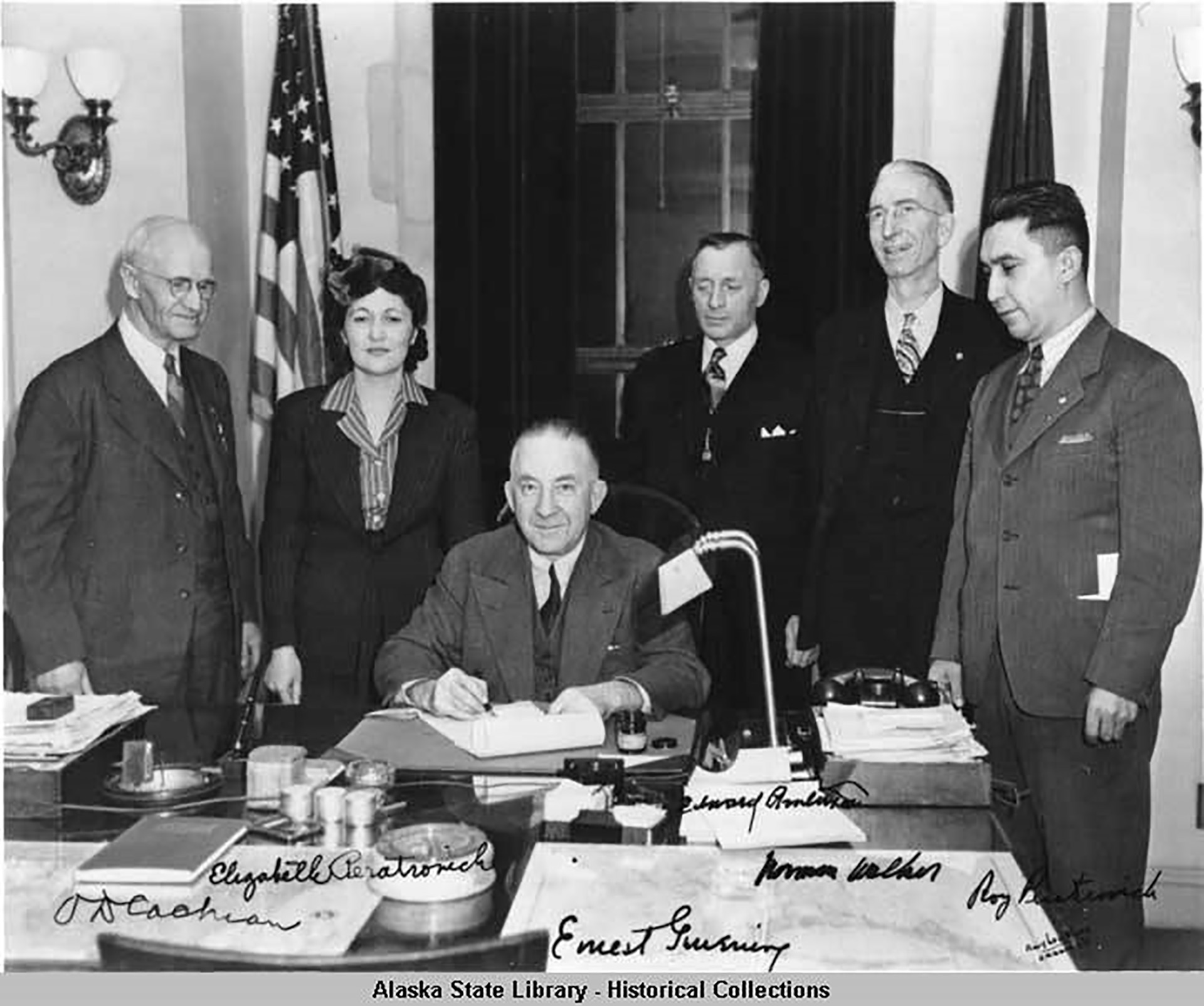
- Details
- By Jenna Kunze
During the month of March, in recognition of Women's History Month, Native News Online will feature various Native American women who have contributed to the betterment of Indian Country.
Elizabeth Peratrovich (July 4, 1911 - December 1, 1958)
An Alaska Native civil rights leader, Elizabeth Peratrovich (Tlingit) was before her time. She was instrumental in passing the Anti-Discrimination Act of 1945 that ended legal discrimination against Alaska Native people—two decades before Martin Luther King Jr.'s influential Civil Rights Act of 1964.
Peratrovich, born in 1911 in St. Petersburg, Alaska, grew up during a time where signs outside of restaurants often read: “No Indians or dogs allowed.” As a young woman, witnessing this discrimination was the inspiration that set Peratrovich and her husband, Roy Peratrovich (Tlingit), on a lifelong endeavor to end discrimination against Natives. In 1941, they wrote a letter to their governor, asking him to remove the racist signs, which was ultimately the first step in their push towards the Anti-Discrimination Act.
Peratrovich spent years traveling across the Alaska Territory campaigning for the act, which ultimately failed in 1942 with a tie vote in the House. She famously testified before the Alaska Territorial legislature—as one of two people in favor of the bill (the other was her husband)— in response to a Senator Allen Shattuck’s comment that “the races should be kept further apart.” “Who are these people, barely out of savagery, who want to associate with us whites with 5,000 years of recorded civilization behind us,” Sen. Shattuck asked.
Peratrovich responded: “I would not have expected that I, who am barely out of savagery, would have to remind the gentlemen with 5,000 years of recorded civilization behind them of our Bill of Rights. Do your laws against larceny and even murder prevent those crimes? No law will eliminate crimes, but at least you as legislators can assert to the world that you recognize the evil of the present situation and speak your intent to help us overcome discrimination.”
Peratrovich’s son, Roy Peratrovich Jr., has commented that, although his mother was known for her speech-writing and knowledge of the political process, her most effective leadership was her presence.
“At first, everyone expected my father to be the one carrying the guns,” he told the Central Council of Tlingit and Haida Indian Tribes of Alaska. “They weren’t ready for my mother.”
Her work also furthered Alaska Native voting rights. In 1924, Congress passed the Indian Citizenship Act that allowed citizenship for Native Americans. But in 1925, the Alaska Territorial Legislature passed the Alaska Voters Literacy Act that required voters to speak and read English, effectively disenfranchising non-English-speaking Alaska Natives.
Peratrovich’s work with the Alaska Native Sisterhood, a nonprofit founded to address racism in Alaska, also furthered the movement that ultimately amounted in the passage of the 1965 Voting Rights Act. The Act eliminated poll taxes, literacy tests, and other barriers that had previously blocked non-English speaking or low income voters. Although Indigenous voting disenfranchisement still persists today, Peratrovich is recognized for having significantly furthered the cause.
The State of Alaska has recognized February 16 as Elizabeth Peratrovich Day since 1988. But in February 2023, the United States Senate recognized the holiday nationally, thanks to legislation introduced by Alaska Senators Dan Sullivan and Lisa Murkowski. Also, in 2020, the civil rights activist was commemorated on $1 coins for her contributions to the betterment of Alaska Natives for future generations.
More Stories Like This
Native News Weekly (August 25, 2024): D.C. BriefsNavajo Nation Mourns the Passing of Former Vice President Rex Lee Jim
Deb Haaland Earns Endorsement From Communications Workers of America Local 7076
University Soccer Standout Leads by Example
Two Native Americans Named to Democratic Congressional Campaign Committee's“Red to Blue” Program
Help us defend tribal sovereignty.
At Native News Online, our mission is rooted in telling the stories that strengthen sovereignty and uplift Indigenous voices — not just at year’s end, but every single day.
Because of your generosity last year, we were able to keep our reporters on the ground in tribal communities, at national gatherings and in the halls of Congress — covering the issues that matter most to Indian Country: sovereignty, culture, education, health and economic opportunity.
That support sustained us through a tough year in 2025. Now, as we look to the year ahead, we need your help right now to ensure warrior journalism remains strong — reporting that defends tribal sovereignty, amplifies Native truth, and holds power accountable.
 The stakes couldn't be higher. Your support keeps Native voices heard, Native stories told and Native sovereignty defended.
The stakes couldn't be higher. Your support keeps Native voices heard, Native stories told and Native sovereignty defended.
Stand with Warrior Journalism today.
Levi Rickert (Potawatomi), Editor & Publisher


